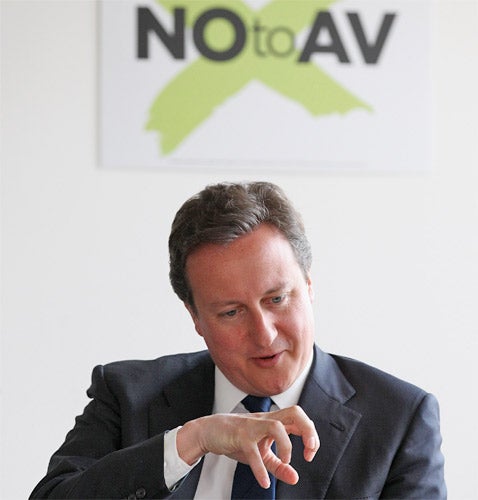Andrew Grice: The week the No camp wheeled out its big gun – and he fired on Clegg
Inside Westminster

It wasn't supposed to be like this.
At least, that is what Nick Clegg thought when he and David Cameron agreed they would both adopt a low profile and avoid personal attacks during the campaign ahead of the 5 May referendum on the voting system.
Fear of losing the vote has persuaded Mr Cameron to rewrite the rulebook and leave his friend Nick, already public enemy No 1, exposed to even more fire.
Last autumn, the Prime Minister's approach was so laid back that some Tory MPs wrongly suspected he was relaxed about losing the referendum. Most media speculation focused on the consequences of a No-to-AV vote on Mr Clegg. Mr Cameron brushed aside warnings from allies who urged him to think about the impact of a Yes vote.
The mood at Number 10 changed dramatically in the new year when opinion polls suggested the referendum was too close to call. Some insiders judged that a Yes vote could be worse for Mr Cameron than a No vote would be for an already embattled Mr Clegg. Tory MPs and activists would see Mr Cameron as a two-time loser, hoodwinked by the Liberal Democrats into a change that could prevent a true-blue government enjoying unfettered power ever again. Mr Cameron swung into action, helping the No camp raise money and telling Conservative Campaign HQ to pull out all the stops in opposing AV.
Last month Mr Cameron promised his MPs he would make one speech a week opposing AV. In the past week, he seems to have made a speech on AV once a day. It seems to be working. The polls have shifted in the No camp's favour. Some involved in the Yes campaign believe Mr Cameron's high-profile intervention has tipped the scales against them. A year ago, he couldn't win a majority against a worn-out Labour government with an unelectable leader. But he has looked the part as Prime Minister from day one and settled some doubts many people had about him last year.
Next week the Yes camp will pay Mr Cameron a backhanded compliment by telling non-Tories that a No vote would risk giving him an overall majority next time. Labour supporters hold the key. Polls suggest they are narrowly against AV; the temptation to "kick Clegg" for joining forces with the Tories seems a more powerful emotion than sending a shot across Mr Cameron's bows. "If we could turn the Labour vote around, we would win the referendum," said one senior Liberal Democrat.
The campaign is not an edifying spectacle. The debate on a new politics is being fought very much under the rules of the old politics, with tit-for-tat attacks and personality politics.
The No camp insists it is running a "positive" campaign in favour of the current first-past-the-post system. You could have fooled me. Why, then, does the ubiquitous Mr Clegg feature on the No team's main campaign leaflet under a "broken promises" headline, holding that ill-fated pledge card promising to vote against any increase in university tuition fees?
On Monday, Mr Cameron invoked the "broken promises" argument. "The more people see a clear link between the pledges in a manifesto and the action taken in government, the greater the sense of accountability," he said. "And the real, unavoidable truth about AV is that it would damage that chain of accountability because it makes coalitions much, much more likely." Not necessarily, according to independent academics, since AV would normally give the Liberal Democrats only a modest boost.
Mr Clegg believes the Cameron speech breached their understanding and was rich, since he agreed to raise tuition fees only because the Tories were so determined to. It seems that one man's broken promise is another man's compromise.
Mr Cameron's message is remarkably similar to the stark warnings the Tories issued a year ago about the perils of a hung parliament. Remember all their predictions of instability, horse-trading and weak government unless they won a majority?
If you had just landed from Mars and saw Mr Cameron in action this week, you would not have guessed that he headed a Coalition Government. Yet he also argues, rightly, that the Coalition is delivering strong government. And whether or not you agree with the pace and scale of its spending cuts, it is hard to accuse this administration of being weak. Although Mr Cameron would never admit it, his Government is a good advert for AV.
Strangely, the Prime Minister didn't mention the Tories' "broken promises" on inheritance tax cuts, rewarding marriage in the tax system or a British Bill of Rights. Presumably, he regards them as part of the new politics of consensus and compromise.
He is not the first politician to try to have his cake and eat it, and won't be the last. But equating AV with "broken promises" highlights the flaw at the heart of his argument. The man from Mars might conclude that Mr Cameron believes this Coalition was fine as a one-off because it got him across the Number 10 threshold. Safely installed, it seems, he wants to pull up the drawbridge and revert to the old politics.
Join our commenting forum
Join thought-provoking conversations, follow other Independent readers and see their replies
Comments
Bookmark popover
Removed from bookmarks